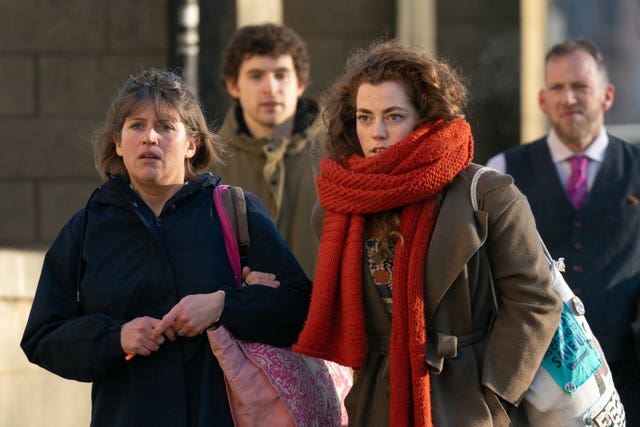A jury has retired to consider its verdicts on six Just Stop Oil protesters accused of risking “serious harm” to Formula 1 drivers and marshals during a track invasion at last year’s British Grand Prix.
Prosecutors allege six members of the environmental campaign group were “all in it together” as they created a risk of death or personal injury at Silverstone, with five of them sitting down on the circuit’s Wellington Straight.
A two-week trial at Northampton Crown Court has been shown in-car footage of F1 stars Yuki Tsunoda and Esteban Ocon passing three men and two women who were sitting on or being dragged off the track.
Just Stop Oil members David Baldwin, 47, Emily Brocklebank, 24, Alasdair Gibson, 22, Louis McKechnie, 22, Bethany Mogie, 40, and 29-year-old Joshua Smith all deny causing a public nuisance on July 3.
Brocklebank, of Yeadon, Leeds; Gibson, from Aberdeen; Mogie, from St Albans; McKechnie, from Manchester; and Smith, from Lees in Oldham, went on to the race circuit before being removed by marshals.

All six defendants gave evidence during the trial and deny prosecution claims that they created a risk of harm to themselves, the drivers involved in the race, marshals and the Silverstone community.
McKechnie, who grew up in Weymouth in Dorset, told jurors the group had planned the protest over two-and-a-half months, making it as safe as possible.
He also denied that the action, designed to draw media attention to Just Stop Oil’s call for the Government to halt new fossil fuel extraction licences, had been reckless.
Smith said he had relied on “meticulous” planning by others and that the plan to go onto the track, after a red flag was raised, was specifically designed to avoid serious harm.
Brocklebank said the Wellington Straight was deliberately chosen for safety reasons, while Mogie said she would never take part in anything which would risk hurting anyone.
Gibson said he, like McKechnie, had watched footage of previous races to satisfy himself that the group’s actions would be safe – with a red flag being a “pre-condition” for entering the track.
In his evidence, Baldwin said he believed the circumstances were controlled and safe, claiming that two highly-skilled drivers had passed the protesters with no issues.
In his closing speech to the jury on behalf of Baldwin, defence barrister Rabah Kherbane said of the defendants, five of whom were sitting nearby behind the glass-fronted dock: “They have all gone up and given evidence.
“I want you to look at them. They shouldn’t be in there. I want you, members of the jury, to fight for them in there (the jury retirement room).
“These are normal decent people. It’s not sympathy I am seeking, it’s the assessment that they wouldn’t set out to cause or risk serious harm.”
Before inviting the jury to retire on Wednesday afternoon, trial judge Mr Justice Garnham instructed its members not to rush in reaching verdicts.
They will continue their deliberations from 10am on Thursday.






